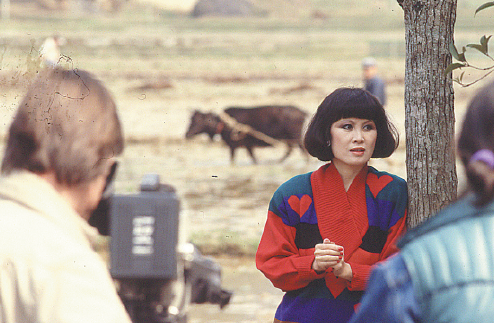 |
|
Kan works on her 1988 documentary Journey Through a Changing China in Guilin, Guangxi Zhuang autonomous region, in 1987. PHOTOS PROVIDED TO CHINA DAILY |
Journey to China
Kan is also credited as being the first TV journalist to connect East and West with the creation of her award-winning weekly show Looking East, which aired in the US. The program was her first major production and the first of its kind to introduce American audiences to Asian cultures in countries including Thailand, Malaysia and Singapore.
Having observed that the West didn't know much about Asia, particularly China, Kan believed it was her duty to help the United States and China get to know each other better. She also produced and hosted a documentary in 1988 called Journey Through a Changing China.
Starting from her hometown in Guilin, in the Guangxi Zhuang autonomous region, she crisscrossed northward to Shanghai and Hangzhou, in Zhejiang province, until she reached Harbin in the northeastern province of Heilongjiang. Footage was shot in each city she visited, to display people's daily lives and how they had changed during reform and opening-up.
The one-hour documentary aired on June 22, 1988, on WUSA-TV in Washington.
Kan's efforts to be a bridge between China and the US were recognized in a Senate Congressional Record, and she was given the title of citizen ambassador. The record entry dated July 27, 1988, said the documentary was "exceptional in its scope and subject".
"Kan opened doors in her documentary to places most of us have only read about," Senator Daniel K. Inouye wrote in the record. "Her charming, insightful and loving portrait of China gave me a new perspective toward the changes now occurring in that ancient land.
"I hope that Journey Through a Changing China will be seen by other audiences throughout our nation because of its fascinating and revealing study of the social, economic and cultural changes being brought about by China's version of the glasnost."
Looking back, Kan said she felt her role, and that of the media as a whole, was to educate.
"In those days,... China didn't know anything about the world. The West knew nothing about Asia," she said. "My role was to exchange ideas between East and West. I feel that's a mission, an important job to do."
Exporting homegrown fashion
In the early 1980s, Kan looked different with her lipstick and self-styled hairdo in the eyes of Chinese women. But today, in her eyes, Chinese women look modern, and they no longer dress differently to Western women.
Kan said China has changed a lot, as now its manufacturers are up-to-date. For years, they worked for brands from other countries, such as France and Italy. Today, she said, Chinese companies have their own brands.
"Because they're so used to producing goods for the outside world, they know well what the outside world is asking for. All of a sudden, you see a lot of brands coming out of China that are quite chic," Kan said.
To bring Chinese fashion to the West and introduce emerging designers and artists to the US, Kan created the China Fashion Gala in New York. The past three galas have highlighted couture designer Guo Pei, fashion photographer Chen Man and designer Grace Chen, to name a few.
Funds raised through the gala are used for scholarships for Chinese students to attend the Fashion Institute of Technology in New York.
Kan's own charity has also built schools and libraries, and provided scholarships to underprivileged students in high schools and universities in China, including in her native Guilin, where she lived until she was 2 years old. Her family first moved to Hong Kong and then the US.
In March, she returned for the first time to where she was born, a Qing Dynasty-style building called Yanshan Garden, which has been made into a picturesque park.
Kan said she was happy to see the development that has taken place in her hometown and across China.
"The next period for China will be extraordinary. President Xi Jinping will be able to fulfill his mission, fulfill his vision, too," she said, referring to China's goal to become a moderately well-off country by 2020 as well as Xi's commitment at the Boao Asia Forum on China to further opening-up. "I'd bet on China," she said.